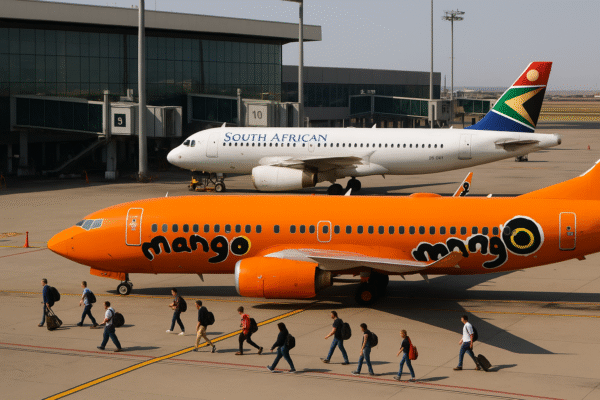South Africa’s tourism industry is facing a sharp shift with the official closure of Mango Airlines, the once-popular budget carrier owned by South African Airways (SAA). After months of failed rescue attempts, investor searches, and regulatory hurdles, Mango’s grounded planes will now remain parked permanently. This closure reshapes the domestic and regional travel landscape, leaving travelers, tour operators, and tourism stakeholders to grapple with reduced options for low-cost air travel.
For years, Mango Airlines was the go-to choice for affordable flights linking Johannesburg, Cape Town, Durban, and Port Elizabeth. It allowed millions of South Africans and international visitors to travel across the country without breaking the bank. With its absence, the gap in the low-cost sector could strain tourism growth and raise travel costs, making South Africa a pricier destination.
Domestic Tourism Hit by Higher Costs
The disappearance of Mango Airlines places immediate pressure on domestic tourism. Local families, students, and business travelers relied heavily on Mango’s low fares for weekend breaks, reunions, and quick business trips. Its routes played a vital role in boosting hotel occupancy, visitor numbers at game reserves, and attendance at cultural festivals across South Africa.
Now, with fewer budget seats available, airlines may raise fares, and flight availability could become tighter, particularly on high-demand routes such as Johannesburg–Cape Town. For many households, this may lead to fewer short trips and longer planning cycles for holidays. The knock-on effect could harm restaurants, shuttle services, guesthouses, and souvenir shops that thrive on regular domestic visitors.
International Tourism Also Feels the Pinch
Mango Airlines didn’t just serve South Africans—it also supported international tourism by offering low-cost routes to popular regional destinations like Mauritius and Zanzibar. These affordable options helped position South Africa as a convenient hub for tourists seeking to explore both the country and its neighboring regions.
With Mango’s exit, visitors arriving from Europe, Asia, and North America may face higher prices when traveling across South Africa or branching out to nearby islands. This could discourage some travelers from adding extra stops to their itineraries, dampening the tourism sector’s post-pandemic recovery momentum.
Challenges for South African Airways and Tourism Strategy
The closure of Mango Airlines also casts a spotlight on South African Airways, which has battled financial instability for years. Without Mango’s presence, SAA will be under pressure to strengthen its domestic and regional offerings. However, with its own restructuring challenges, filling the void left by Mango will not be easy.
South Africa’s government and tourism bodies have long emphasized the importance of affordable flights for boosting the country’s appeal. Mango’s closure highlights the fragility of this strategy and underscores the urgent need for new low-cost carriers to step into the market. Without such solutions, South Africa risks losing ground in the fiercely competitive global tourism industry.
Tourism Leaders Search for Solutions
Tourism stakeholders are now focused on damage control. Regional airlines may expand their fleets and routes to cover Mango’s absence, but this will take time and investment. At the same time, international carriers are being encouraged to increase direct flights to South African cities like Cape Town, Durban, and Johannesburg to keep costs manageable for visitors.
The South African Tourism Board is doubling down on campaigns to position the country as a must-visit destination despite rising flight costs. South Africa remains a global favorite for its safari adventures, wine routes, pristine beaches, and rich cultural heritage. However, the lack of budget-friendly domestic connections may reduce travelers’ ability to explore multiple regions during one trip.
Looking Ahead: Building a Resilient Tourism Future
The closure of Mango Airlines underscores the need for a stronger and more diversified aviation sector. To protect the tourism industry, South Africa must attract investment into airport infrastructure, regional flight networks, and tourism partnerships. Boosting competition among airlines can keep fares accessible and ensure steady visitor flows.
Government officials, including the Department of Tourism, stress that aviation stability is essential for long-term growth. A resilient system will help sustain both domestic and international tourism, ensuring that South Africa continues to rank as one of the world’s leading travel destinations.
South Africa’s natural wonders—such as Table Mountain, Kruger National Park, and the Garden Route—remain world-class attractions. While Mango’s absence is a setback, the country’s tourism potential remains strong. By welcoming new airlines, improving travel infrastructure, and enhancing marketing strategies, South Africa can maintain its status as a top-tier travel destination even without its beloved budget carrier.
For more travel news like this, keep reading Global Travel Wire


















